|
|
|
Sort Order |
|
|
|
Items / Page
|
|
|
|
|
|
|
| Srl | Item |
| 1 |
ID:
134787
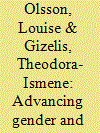

|
|
|
|
|
| Summary/Abstract |
Research on gender and peacekeeping has been revolving around two strands of questions. First, what form of peace does peacekeeping contribute to establishing? And second what are the gender dimensions of how peacekeeping is implemented? Subthemes underlying these questions are concerned with whether women's participation and gender aspects of security should be integral parts of the post-war society and the effectiveness of current gender mainstreaming and balancing policies. In this commentary we argue that there has been considerable progress in the field of gender and peacekeeping. Feminist research has raised questions about the understanding and conceptualisation of peace and security, while empirical research systematically explores the gender dimensions of peacekeeping. Yet, in order for research on gender and peacekeeping to progress, it needs to address issues such as theory underdevelopment, lack of data and continued exclusion from mainstream research. The commentary highlights as an area of particular concern the failure of existing research to find common ground and outlines opportunities of building bridges between empirical and feminist researchers.
|
|
|
|
|
|
|
|
|
|
|
|
|
|
|
|
| 2 |
ID:
134783
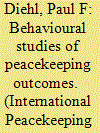

|
|
|
|
|
| Summary/Abstract |
This article provides an overview of peacekeeping studies in the behavioural tradition, namely those driven by a theoretical orientation to explain causal relationships and ones in which those theoretical arguments are tested by reference to historical cases, often in a large-N and statistically dependent research design. Critiques of existing studies focus on how the importation of theoretical approaches and the availability of data have conditioned existing research. Several pathways for future research are outlined, including better theoretical development, broader and more varied indicators of peacekeeping success, greater attention to unintended consequences, adoption of spatial frameworks of analysis, and paying greater attention to non-UN operations.
|
|
|
|
|
|
|
|
|
|
|
|
|
|
|
|
| 3 |
ID:
134779
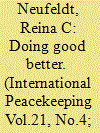

|
|
|
|
|
| Summary/Abstract |
This article explores the ethics of peacebuilding. It argues that the perspectives of two moral theories currently dominate peacebuilding discourse: duty-based and consequentialist thinking. While these moral theory perspectives possess merits there are also important limits, which are particularly important for peacebuilding. The article argues that if peacebuilding is genuinely to contribute to collective flourishing then we need to recognize and act upon a more holistic ethics of peacebuilding practice. Considerations drawn from ethics of care and virtue ethics are therefore proposed to expand considerations of what constitutes ‘good’ and ‘right’ within peacebuilding interventions.
|
|
|
|
|
|
|
|
|
|
|
|
|
|
|
|
| 4 |
ID:
134782
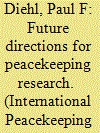

|
|
|
|
|
| Summary/Abstract |
Compared to studies of war and other phenomena, analyses of peacekeeping are relatively recent and parallel the frequency and importance of that management technique in addressing conflicts around the globe. Early works in the 1960s through most of the 1980s were largely descriptive, single case studies offered by peacekeeping commanders and others involved directly in the conduct of the operations. Reflecting on these, Fetherston noted the lack of theory guiding peacekeeping studies at the time, as even some studies that sought to develop generalizations across missions did so largely inductively within a positivist framework.1 Paris's review several years later was more encouraging in terms of theoretical potential, although he expressed concern that peacekeeping studies still did not address the ‘big’ debates in international relations.2 Among his suggestions were embedding peacekeeping studies in terms of norms and global governance.
|
|
|
|
|
|
|
|
|
|
|
|
|
|
|
|
| 5 |
ID:
134785
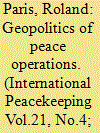

|
|
|
|
|
| Summary/Abstract |
The study of peace operations, which has undergone remarkable growth in recent years, has been paying greater attention to the ‘micro-level’ processes and local dimensions of these missions. This is a welcome development. However, the closer one gets to the local specificities of individual peace operations, the easier it may be to lose sight of the broader patterns of these missions, including how they fit into – and are reflections of – international politics writ large. This article contends that there is a continuing need for this type of ‘macro-level’ research, particularly at a moment of shifting power in the international system. It further argues that a research agenda focusing on the ‘geopolitics’ of peace operations would open up at least three interesting and potentially important avenues of macro-level study.
|
|
|
|
|
|
|
|
|
|
|
|
|
|
|
|
| 6 |
ID:
134784
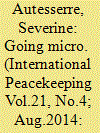

|
|
|
|
|
| Summary/Abstract |
In the past 15 years, scholars have started studying the local and micro-level dimensions of peacekeeping. They have investigated the nature and effectiveness of bottom-up peacebuilding, assessed the local versus national impacts of peacekeeping interventions and studied the decentralized actions of international peacebuilders on the ground. This commentary shows that, despite the approach's limitations, delving into these three topics opens up fruitful areas for further research, in particular analysing micro-to-macro linkages, evaluating peacekeeping's subnational impacts across cases, explaining peacebuilding successes and understanding the causes of peace itself.
|
|
|
|
|
|
|
|
|
|
|
|
|
|
|
|
| 7 |
ID:
134780
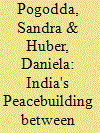

|
|
|
|
|
| Summary/Abstract |
This paper analyses India's internal peacebuilding approach in Bihar, north-east India and Jammu and Kashmir regarding its similarity with the liberal peace and its effectiveness in terms of conflict transformation. By focusing on the human rights and needs components of Indian peacebuilding, we investigate whether state interventions have managed to transform the local conflict spheres in their political, economic, societal and gender/family dimensions. Drawing on fieldwork carried out between 2011 and 2013, the paper remains sceptical about both the novelty and effectiveness of the Indian peacebuilding approach.
|
|
|
|
|
|
|
|
|
|
|
|
|
|
|
|
| 8 |
ID:
134781


|
|
|
|
|
| Summary/Abstract |
It is frequently argued that informal groups are established, designed and maintained because of their effectiveness in addressing common security challenges. The quartet’s poor record in conflict mediation defies this view. Putting forward a ‘power-based’ argument, this article identifies key motivations that can sustain informal cooperation even in the absence of effective collective action. Specifically, cooperation in the Quartet rests on an “implicit bargain”. The weaker parties accept leadership by the USA, providing the most powerful member with a legitimizing function and additional clout. In return, they gain a seat at the diplomatic table resulting primarily in ‘reputational’ advantage.
|
|
|
|
|
|
|
|
|
|
|
|
|
|
|
|
| 9 |
ID:
134786


|
|
|
|
|
| Summary/Abstract |
Peacekeeping was a major contribution to the twentieth-century project of peace in the sense of providing a tool through which a preliminary, negative peace could be consolidated in a state-centric world. Upon this basis an elite-level peace agreement could then be mediated between states. However, integrated missions and peacebuilding interventions since the end of the cold war adopted a radically different approach, indicating an ambition to create a liberal state without necessarily receiving local consent. This indicated a shift towards a trusteeship framework, used to install more progressive forms of politics from the West's perspective while enhancing regional security. The latest iteration of this has led to what might be described as neoliberal statebuilding. This has proven to be a dead-end, having done much to discredit the connection between intervention and peace, raising the question of what might replace it, especially in world of structural war and violence.
|
|
|
|
|
|
|
|
|
|
|
|
|
|
|
|
| 10 |
ID:
134788
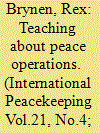

|
|
|
|
|
| Summary/Abstract |
The complex, multidimensional nature of contemporary peacekeeping operations presents particular challenges for teaching about them in the classroom. Teaching should bridge the academic/policy divide, and impart a real sense of the political complications and operational challenges of peacekeeping. Fortunately, teachers can call upon new resources to help address these challenges. These include, in addition to the growing body of scholarly research, practice-oriented materials produced by operational agencies. It is increasingly easy to bring field perspectives into the classroom via the internet. Finally, classroom simulations can be particularly useful in exploring the ‘problem space’ of contemporary peace operations.
|
|
|
|
|
|
|
|
|
|
|
|
|
|
|
|
|
|
|
|
|